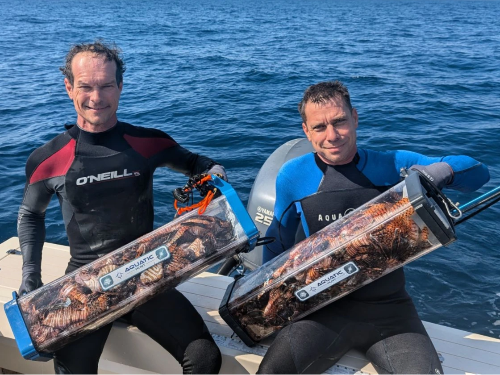

A transformative new tank transport solution - The Transporter offers the ultimate in tank AND valve protection in the back of a truck, SUV or car. This universal-fit design accommodates 9 sizes of steel and aluminum tanks, has a non-slip backing (no more clanging), tank strap and valve coverage. Link together 2 or more as needed.
Aquatic Hunt gear is sold nationwide and throughout the Caribbean.
Ask your local shop about carrying Aquatic Hunt products—or, if you'd like to check on a specific retailer, just drop us a line!
Why Do Tournament Champions Trust Aquatic Hunt?
_edited.png)



FWC Lionfish Challenge 2024 Winners
FWC Lionfish Challenge 2023 Winners
Testimonials
Lionfish FAQ
1. What is a lionfish and why are they a problem?
Lionfish are venomous reef-dwelling fish native to the Indo‑Pacific. They’ve become invasive in the Atlantic, Gulf of Mexico, and Caribbean—eating native reef species, disrupting ecosystems, and multiplying rapidly South Carolina Aquarium+15National Ocean Service+15Lionfish Divers+15.
2. How did lionfish get introduced to Florida and the Atlantic?
The first sighting in Florida occurred in 1985 off Dania Beach. The population grew after aquarium releases during Hurricane Andrew in 1992. Genetic studies confirm aquarium origins SafeSpear+1Wikipedia+1.
3. Do you need a license or certification to hunt lionfish in Florida?
No license is required for spearfishing lionfish, including pole spears or rechargeable devices. However, a Saltwater Products License is required to sell harvested lionfish TheNewYorker+10FWC+10CORE VI.
4. Do I need scuba training to hunt lionfish?
Scuba is not strictly required—freediving is possible—but scuba diving is strongly recommended to safely access depth, carry gear, and hunt effectively Lionfish Divers.
5. Are lionfish dangerous to humans if they sting?
Yes, lionfish spines contain venom that can cause painful swelling, nausea, and in rare cases systemic reactions. Human fatalities are rare, but basic first aid and medical attention may be needed Wikipedia+9Wikipedia+9Lionfish Central+9.
6. Can lionfish be eaten, and is it safe?
Yes! Lionfish are edible and mild-tasting. They’re promoted as invasive-species cuisine, featured in ceviche, and commonly described as buttery white fish similar to mahi-mahi Food & Wine.



_edited.jpg)

















